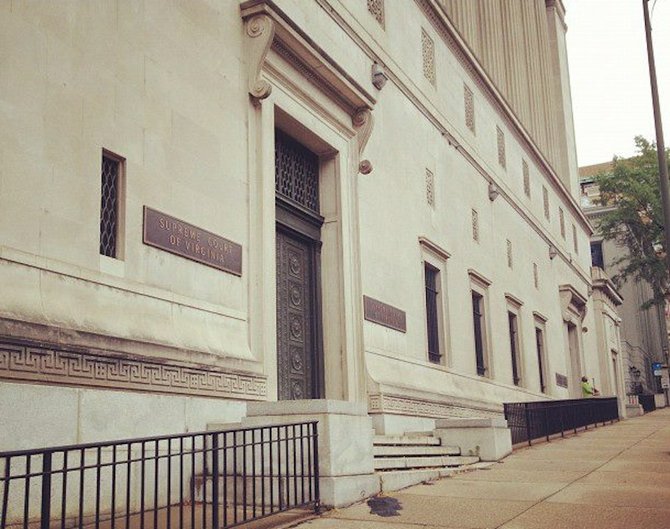No photographs, videos or audio recordings are allowed in the Virginia Supreme Court. Photo by Michael Lee Pope.
Justices of the Virginia Supreme Court have rejected the argument City Attorney James Banks outlined during oral arguments back in September that the city has the ability to lease a public alley to a private business. At issue in the case is Wales Alley, which members of the Old Dominion Boat Club say they have a right to use dating back to the 18th century. When members of the Alexandria City Council leased the alley to Virtue restaurant back in 2010, the club filed a lawsuit. During oral arguments back in September, the justices seemed to indicate the city didn't have much of a case.
"Your argument is premised on something that is not correct," Chief Justice Cynthia Kinser told City Attorney James Banks at one point. "You haven't told us how the easement gets swept up."
Banks tried to make the case that the city dedicated the alley a public street by actions if not by explicit action. Under the city attorney's theory, the private rights was extinguished in the 1970s when city officials began clearing snow, filling potholes and issuing parking tickets. Last week, justices issued an opinion rejecting that argument.
"Because the conversion of Wales Alley to a public street did not result in a cessation of the purpose for which the easement was granted, ODBC's easement over Wales Alley was not extinguished when Wales Alley became a public street,"
THE STORY OF WALES ALLEY dates back to 1789, a few years before Alexandria became part of the original District of Columbia. It was originally called Fitzgerald Alley in honor of Alexandria Mayor John Fitzgerald, one of the major landowners in the city. By 1786, people started calling it Wales Alley when Andrew Wales started selling beer there. Three years later, Fitzgerald and Maryland businessman Valentine Peers divided their holdings, securing a deed that allowed for "free use and passage of the several streets and alleys."
That deed, now held by the Old Dominion Boat Club, was at the heart of the legal case. For leaders of the Boat Club, the fight to keep Wales Alley open is only one of a series of disputes with city officials, who are currently threatening to use the power of eminent domain against the club to accomplish the goals of the controversial waterfront plan. That ongoing feud was part of the debate in 2010 when a majority of City Council members approved a lease to Virtue restaurant.
"The citizens of Alexandria and the Old Dominion Boat Club spent hundreds of thousands of dollars in legal fees to find out the city attorney was incorrect," said former Republican City Councilman Frank Fannon, who is a member of the Boat Club. "We need to have a city attorney who will tell the City Council what the law is, not what the majority of City Council members want it to be."
THE CITY'S ONGOING fight with the Boat Club is not over. Now that Alexandria Mayor Bill Euille has abandoned his longtime opposition to using eminent domain against the Boat Club, city officials have scheduled a Nov. 19 public hearing on the issue. For Euille and city leaders who invested time and attention to fighting the Boat Club over Wales Alley, the Virginia Supreme Court ruling was a setback.
"We are disappointed by this ruling, but we accept it," said Euille in a written statement. "However, this does not affect our implementation of the adopted Waterfront small-area plan."
At issue in that conflict is a waterfront parking lot and boat launch at the foot of King Street, which the waterfront plan envisions as a public part. The Boat Club is offering an easement across east side of parking lot as a compromise, although city officials are pressing ahead with the public hearing. Meanwhile, the fate of Virtue's special-use permit allowing outdoor dining remains unclear. Although the license agreement includes an annual fee of $14,000, city officials never collected any money to lease Wales Alley because the lawsuit was pending.
“The Supreme Court remanded the case back to the Circuit Court," said Deputy City Attorney Chris Spera in an email response to questions. "It would be the Circuit Court’s order that would regulate the parties. No order has been entered by the Circuit Court yet.”
City officials say an appeal of the Supreme Court's decision is unlikely.
